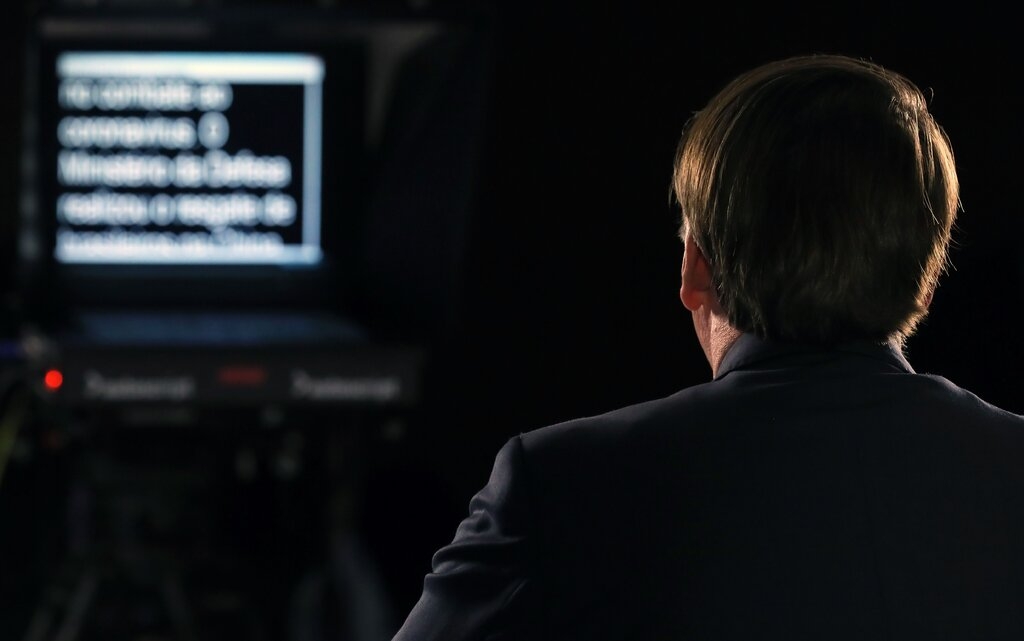
After watching the president for so many days, I finally understood that happiness is a matter of choice.
The New York Times
Sep. 10, 2020
by Vanessa Barbara
Contributing Opinion Op-ed Writer
SÃO PAULO, Brazil — On Aug. 29, my country crossed the threshold of 120,000 people killed by Covid-19. With around 900 new deaths a day, we’re yet to see a downward trend in the outbreak. I wanted to understand why many Brazilians seem unperturbed by this, so I decided to take a desperate measure: I started watching President Jair Bolsonaro’s weekly live broadcasts on YouTube and Facebook.
Yes, I know it sounds pointless, foolish and masochistic, and it kind of is. But after watching three months’ worth of broadcasts — totaling 11 strenuous hours in front of the computer — I can now say that everything has changed. At last!
It was just a matter of perspective, after all. I shouldn’t have relied on traditional media outlets to get information, because they “don’t have anything good to say about Brazil,” according to Mr. Bolsonaro. He singles out a prime-time news program that mostly shows deaths — “funeral TV,” he calls it — as something nobody can enjoy. He is right. The presidential live broadcasts, by contrast, are always uplifting, even if this is mostly accomplished by disputing any negative news about his government.
Just weeks before his inauguration in 2019, Mr. Bolsonaro promised that he would deliver to his supporters a weekly live broadcast accounting for the government’s actions. He explained that the mainstream media often misrepresents the facts. “There is no misrepresentation here,” he said. “You get the news straight, as it is supposed to be given.”
If only I had known this before. I would have learned, for example, that the World Health Organization is actually “shoddy” and that it “lost credibility.” I shouldn’t have worried about its epidemiological reports. According to Mr. Bolsonaro, the organization is “leaving a lot to be desired.” It failed to recognize the miraculous effect of hydroxychloroquine, an anti-malarial drug that cured of Covid-19 some 200 government employees at the presidential building. “Nobody was hospitalized,” he guaranteed. Enough with randomized controlled trials!
After watching the president for so many days, I finally understood that happiness is a matter of choice. Everything that slips from his grasp of reality is beside the point. Mr. Bolsonaro accuses the W.H.O. of being “contradictory” and “one of the least scientific” things in the world. One can infer that the most scientific things are the president’s opinions, which he likes to spread out in endless declarations, always using the same arguments. “Many doctors are already saying that masks do not protect anything,” he recently said. “This is another farce we’re going to see.”
He mentioned hydroxychloroquine in 13 of 14 live broadcasts; many times he even displayed a box of pills on the table. On all the broadcasts I watched — from June to September — he failed to mention the drug only once, on June 25, the same day he claimed, “Nobody protects the environment more than us.”
Well, this is a relief. It turns out that the Amazon rainforest is not really burning, because “it cannot catch fire.” Mr. Bolsonaro claims the devastating fires in the Amazon are a fake news story created by Brazilian newspapers — something that foreign media have propagated. When he does admit that there are some fire outbreaks in the region, he blames not agribusiness but Indigenous people, “caboclos”(people of mixed Indian and white origin), and riverside dwellers. “It’s their culture,” he says. To back up his assertions, he refers to statistics from unknown sources. “I don’t know who said this, but ….”
It’s a delight to see someone so meticulous about facts and figures. Many readers will assume that my brain has turned to mush after binge-watching Mr. Bolsonaro’s broadcasts, but these are totally unsubstantiated claims — as opposed to the president’s relentless accuracy.
During a broadcast in August, he said of something he’d heard, “I don’t know if it’s true or not … Yes, it’s true!” And then, in the same broadcast, “It came to our attention, I won’t say it was from reliable sources.” On another occasion, he abandoned all scruples and just asked us to trust him: “We have real news that hospitals have a surplus of beds.” (In any case, and just to be sure, he encouraged his supporters to “find a way to get inside” public hospitals to film them, showing that they have not been overwhelmed with patients.)
The problem with journalists is that they often “act with mischief,” as I learned. One of them asked on Aug. 23, during the president’s visit to a cathedral, why Mr. Bolsonaro’s wife received 89,000 reais (over $16,500) from Fabrício Queiroz, a former legislative aide alleged to have links to Rio de Janeiro’s militias, clandestine paramilitary groups that function as a kind of mafia. The president answered by telling the reporter, “I feel like punching you in the mouth, OK?” The question remains unanswered.
“It’s not that I run away from the press,” he explained during a July broadcast. The proof is that he makes an exception for three radio journalists who demonstrate “absolute impartiality” by reporting “what’s really going on in Brazil.” Sometimes they get to ask the president questions during the broadcast. One of them once asked why we don’t hear news of corruption in the infrastructure sector anymore; the other demanded to know about the president’s health. Neither got a verbal punch in the mouth.
We can’t get enough of science, strictness and impartiality, clearly.
But just as I was about to finish my cheerful marathon viewing, I had a nightmare. I dreamed that Mr. Bolsonaro was burning a pile of papers that proved his negligence in the handling of the pandemic in Brazil. I couldn’t stop him, but I tried to rummage through the ashes in the hope of saving something. Soon the police came and arrested me. I felt helpless again.
When I woke up, we had reached 127,000 deaths.
Vanessa Barbara is the editor of the literary website A Hortaliça, the author of two novels and two nonfiction books in Portuguese, and a contributing opinion writer.
A version of this article appears in print on Sept. 14, 2020, Section A, Page 23 of the New York edition with the headline: I Watched Bolsonaro’s Broadcasts.

